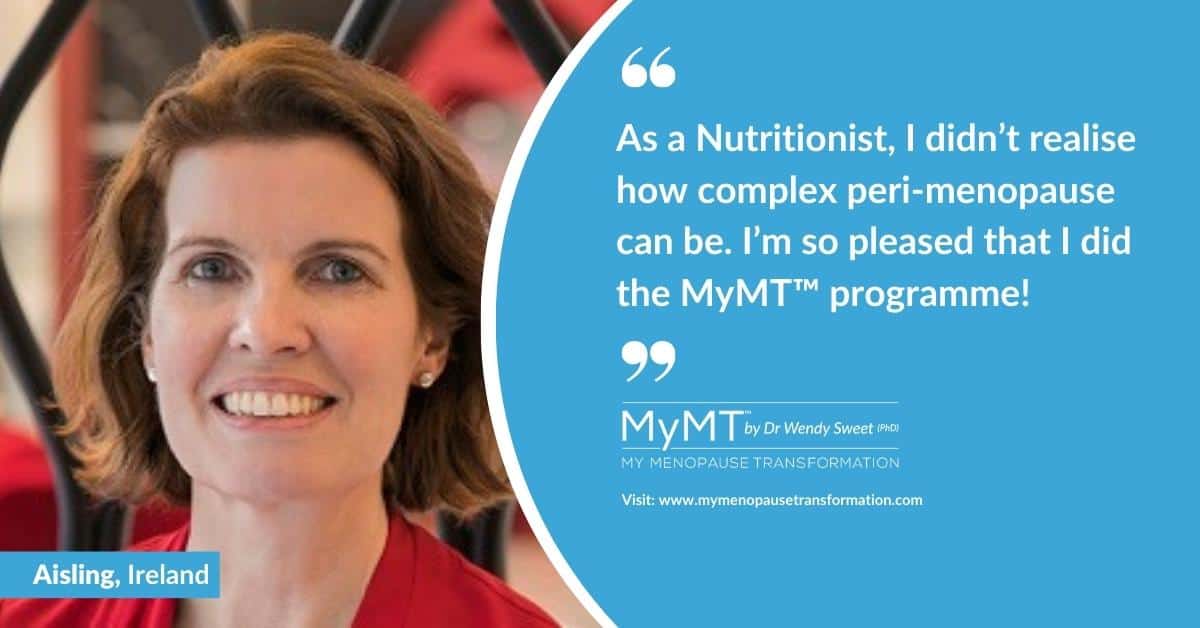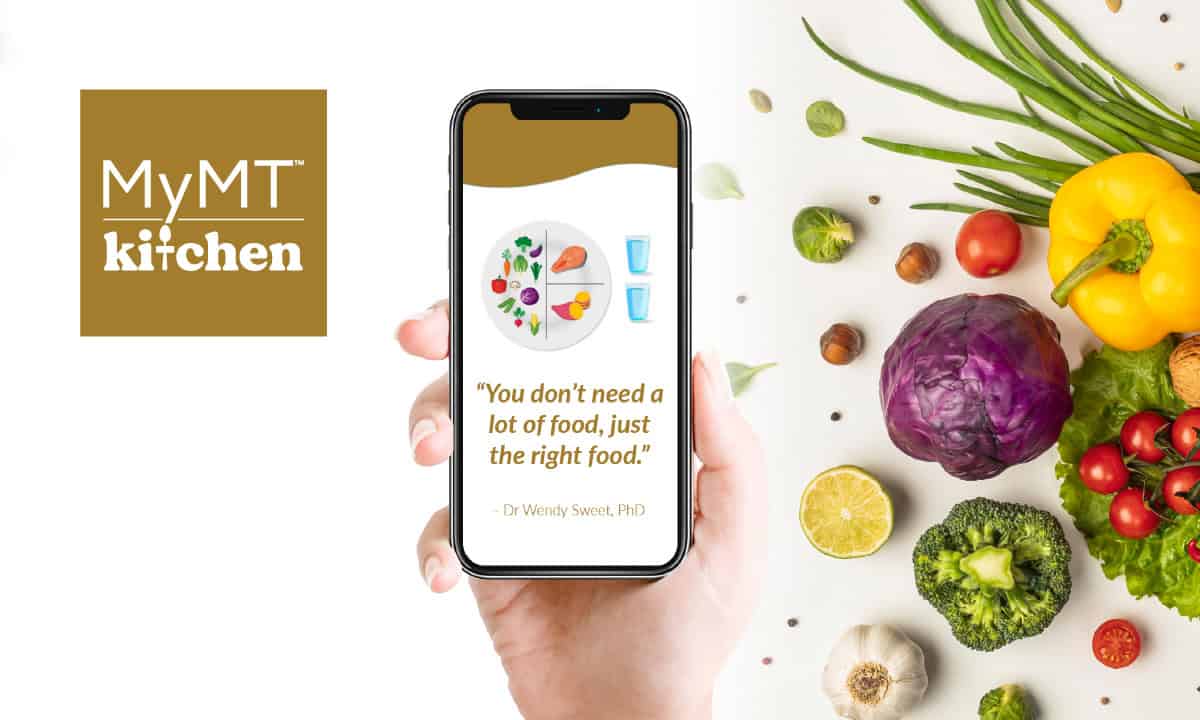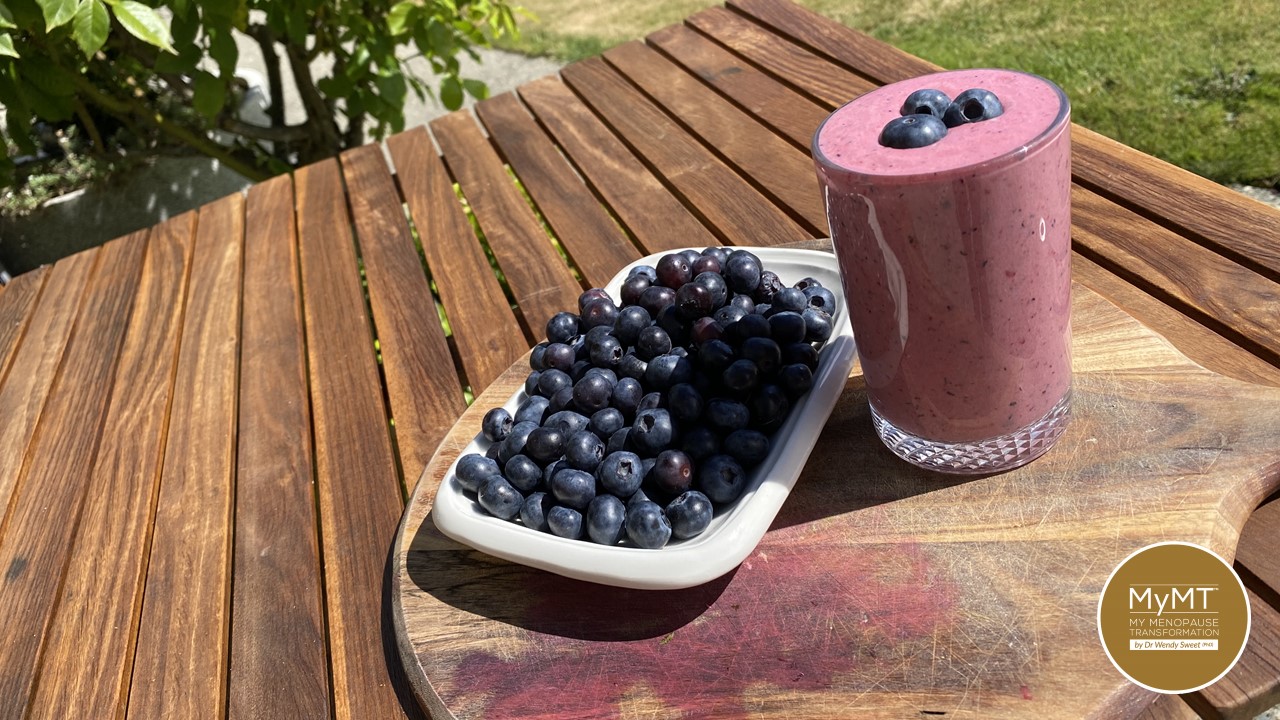The red stains on my chopping board give you a glimpse into my post-menopause nutrition. Those purple stains are from beetroot. Sometimes they are from berries. Sometimes they are from fruits such as pomegranates.
Those purple stains represent my changed and changing eating patterns as I age.
Purple foods are power when it comes to reducing the oxidative stress and inflammation that is now recognised as arriving during our menopause transition and staying with us as we age.
If you’ve been following my posts for a while, you will have heard me talk about the term ‘inflammaging‘ and the work of Professor Gary Egger in lifestyle medicine solutions for reducing the natural course of inflammation as we get older.
Gary’s work has opened my eyes to the possibilities of dietary changes that we need to embrace as we move through menopause and into post-menopause, especially when overweight. (Egger & Dixon, 2011).
As such blueberries and our calcium intake have been on my mind.
Adding foods that are evidenced to help reduce the inflammation that arrives in our blood vessels during menopause – and which help our nervous system to function better are important.
Blueberries possess abundant anthocyanins, which benefit blood vessel health, including the blood vessels in your eyes if you are starting at a computer all day. (Huang et al, 2018).
But it’s not just blue berries that are important. Ensuring that we get 1200mg of calcium daily is important too.
You might think that this is only for bone health, but it’s not just for your ageing bones – our ageing nervous system, including the nerves in our brain, need easily absorbed calcium. I tell you about this in my short video below.
Anti-inflammatory Compounds in Blueberries
Anthocyanins are present in blueberries and here in New Zealand, apparently we grow some of the best in the world. But fresh or frozen, it doesn’t matter.
What matters is that you understand how beneficial they are for your health as you navigate the inflammatory and blood vessel changes that arrive as part of our menopause transition.
I’ve written about these changes extensively (vascular stiffness) and in my 12 week programmes, women learn about the lifestyle solutions that are important to put into place in order to turn around the effects that our hormonal changes in menopause have on our blood vessels.
One of these solutions is to have purple foods, in particular blueberries.
Their possible functional mechanisms include the reduction and reversal of oxidative damage, alteration of retinal (eye) enzyme activity, inhibition of inflammation, stimulation of the immune system (very important in light of all the health chaos in the world), reduction of platelet aggregation (clumping), and modulation of cholesterol production and hormone metabolism (Wang et al, 2015).
More and more scientists and consumers realize the vision-related benefits of anthocyanin-rich berries, and the anthocyanins from berries are currently used in ophthalmology for their capacity to improve vision and prevent diabetic retinopathy – those of you with pre-diabetes or diabetes, may recognise this condition as being a complication of diabetes. It’s caused by damage to the blood vessels of the light-sensitive tissue at the back of the eye (retina).
But there’s more to blueberries than just our eye health.
Study findings from the work of Basu et al, (2010) suggest a cardio-protective role of dietary achievable doses of blueberries in men and women with metabolic syndrome – the cocktail of cardiovascular problems which sit alongside obesity – and these benefits include a significant decrease in systolic and diastolic blood pressures and plasma LDL-cholesterol.
I know from ladies already on my programmes that high blood pressure and changing cholesterol are concerns that arrive in menopause.

So, what should we do about our changing and ageing heart, blood vessels and nerves as we move into post-menopause?
Well, let’s start by turning our back on some of the expensive menopause supplements which simply contain berry extracts and get into the kitchen, dust off the whizzer or nutribullet and make Wendy’s MyMT™ Blueberry and Almond Smoothie.
I made mine yesterday and yes, it was so delicious that hubbie asked for some too.
Wendy’s MyMT™ Blueberry and Almond Smoothie:
- ½ Cup of Almond Milk or Low-fat Milk (if you aren’t allergic to milk)
- 1/2 cup of beautiful Blueberries (fresh or frozen)
- Around 10 frozen Boysenberries
- A palmful of almonds or 2 tablespoons of almond flour
- 1/4 cup of low-fat natural yoghurt
- [I also added in 2 chopped soft nectarines for added natural sweetness but this is optional]
- 1/4 cup of cold water if the mixture is too thick
Put all in the whizzer (I use a Nutribullet Blender) but a whizz-stick would also work.
Pour into a glass and enjoy. You may also have some left over for tomorrow so put it into a stainless steel thermos in the fridge, which protects the nutrients from the light.
I hope you can join me on the MyMT™ programmes sometime. There is so much fantastic information to help you to help yourself manage your menopause symptoms and/or your weight. You also have my support every step of the way.
If you do come on, you will receive a wonderful food guide and an e-book with over 100 recipes that have been specially sourced to meet our nutrient needs in menopause and post-menopause.
As I always say to ladies on the programme, when it comes to reducing our symptoms and/or weight gain, “You don’t need a lot of food, just the right food.”
Dr Wendy Sweet (PhD)/ MyMT™ Founder & Member: Australasian Society of Lifestyle Medicine.

References:
Basu, A., Du, M., Leyva, M. J., Sanchez, K., Betts, N. M., Wu, M., Aston, C. E., & Lyons, T. J. (2010). Blueberries decrease cardiovascular risk factors in obese men and women with metabolic syndrome. The Journal of Nutrition, 140(9), 1582–1587. https://doi.org/10.3945/jn.110.124701
Egger, G. & Dixon, J. (2011). Non-nutrient causes of low-grade, systemic inflammation: Support for a ‘canary in the mineshaft’ view of obesity in chronic disease. Obesity reviews : an official journal of the International Association for the Study of Obesity. 12. 339-45. 10.1111/j.1467-789X.2010.00795.x.
Huang W, Yan Z, Li D, Ma Y, Zhou J, Sui Z. Antioxidant and Anti-Inflammatory Effects of Blueberry Anthocyanins on High Glucose-Induced Human Retinal Capillary Endothelial Cells. (2018). Oxid Med Cell Longev. Feb 22:1862462.
Mann, J. & Trusswell, S. (2007). Essentials of Human Nutrition. United Kingdom: Oxford University Press
Sama DM, Norris CM. Calcium dysregulation and neuroinflammation: discrete and integrated mechanisms for age-related synaptic dysfunction. Ageing Res Rev. 2013 Sep;12(4):982-95.
Stanek A, Grygiel-Górniak B, Brożyna-Tkaczyk K, Myśliński W, Cholewka A, Zolghadri S. The Influence of Dietary Interventions on Arterial Stiffness in Overweight and Obese Subjects. Nutrients. 2023 Mar 16;15(6):1440.
Wang Y., Zhang D., Liu Y. X., Wang D., Liu J., Ji B. P. (2015). The protective effects of berry-derived anthocyanins against visible light-induced damage in human retinal pigment epithelial cells. Journal of the Science of Food and Agriculture. 95(5):936–944.

